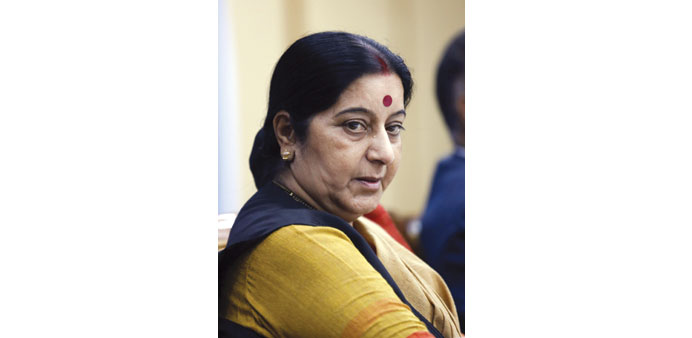|
Indian External Affairs Minister Sushma Sawarj arrived in Kathmandu yesterday on a three-day official visit during which she will co-chair the third meeting of the Nepal-India Joint Commission. |
She is the first high-level foreign official to visit Nepal after the second constituent assembly elections held in this Himalayan nation in November last year.
“I am here two months after the formation of a new government in India,” Sushma Swaraj said in a brief statement on her arrival at Tribhuvan
international Airport.
“I am here to participate in the joint commission meeting,” she said, adding that the new government in India has accorded its relations with Nepal high priority.
Her visit would help improve bilateral understanding at the political level and strengthen mutual trust, said Nepal Foreign Minister Mahendra
Bahadur Pandey.
Besides reviewing the status of bilateral projects, the joint commission will further activate some three dozen mechanisms that exist between the two countries.
The meeting, being held after a gap of 23 years, will review bilateral relations in their entirety. An apex mechanism, the joint commission is mandated to review, assess and evaluate past agreements, project performance and the jobs carried out by the 32 mechanisms established at various levels
between the two countries.
The meeting is expected to seek a way to streamline the channels and provide an
impetus to bilateral ties.
Sushma Swaraj had no official engagement for the day after landing in Kathmandu yesterday. Besides co-chairing the joint committee meeting with her Nepali counterpart Pandey, the Indian minister will call on President Ram Baran Yadav and Prime Minister Sushil Koirala besides meeting political
leaders.
She will leave for New Delhi tomorrow. She will be accompanied by Indian Foreign Secretary Sujatha Singh and officials from the Indian ministries of power, water resources, commerce, road transport, railways, human resource development, culture, and external affairs as also the Indian Council for Cultural Relations. Each side will have a 27-member delegation in the meeting.
According to Nepal’s foreign ministry, the meeting will discuss five core areas of co-operation between the neighbours: political, security, border and border management; economic co-operation and infrastructure; trade and transit; energy and water resource; and culture, education and media.
A joint communique will be issued at the end of the meeting. Several rounds of meetings at the foreign ministry attended by political leaders and experts have provided inputs for the joint commission’s meeting.

